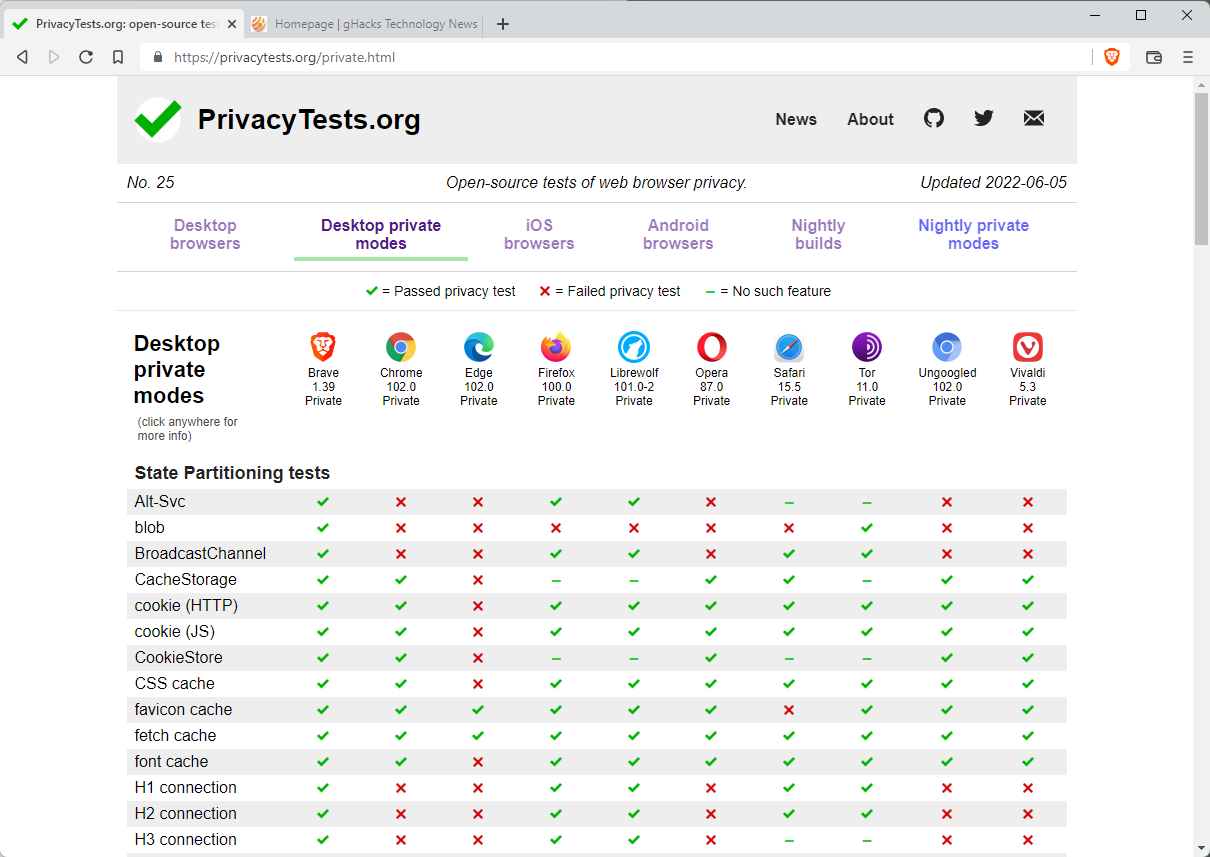All web browsers support some privacy features, some more than others, but none protect users 100% against all privacy threats; that is the quintessence of the tests that PrivacyTests runs regularly.

PrivacyTests is a free website that runs tests regularly to check privacy features and protections in browsers. The organization checks desktop and mobile browsers, development builds of browsers, and the private browsing modes of the browsers.
If you look at the test results, you will notice that bare bones Chromium-based browsers are not doing too well. Google Chrome is a prime example of a browser that is failing most tests. Other Chromium-based browsers, including Edge, Opera and Vivaldi, do not fare a lot better in their default configurations.
In fact, the only two Chromium-based browsers of the tests that perform better are Brave and Ungoogled Chromium.
Firefox protects users better than default Chromium-based browsers, but LibreWolf and Tor offer better privacy protections still; this will change once Total Tracking Protection is enabled for more users. Safari is doing better than the default selection of Chromium-based browsers, but it too is not offering good protections for the most part.
Test results get better when you look at the browser's private modes and how they protect users. Often, tracking protection features are enabled automatically when these modes are used.
Chromium-based browsers get a few extra protections, but Chrome and many other Chromium-based browsers are still inferior when it comes to overall privacy protection. The browsers that do best are Brave, LibreWolf and Tor, followed by Firefox and Safari.
On Android, Chromium-based browsers that use the default configuration are again the worst from a privacy perspective. Google Chrome is not a good choice when it comes to that. Other browsers, including Brave, Firefox Focus, Tor and Bromite are leading the list. Firefox is doing better than the Chromium-based browsers, as is DuckDuckGo.
On iOS, browsers are more limited, but Brave, DuckDuckGo and Firefox Focus are offering the best protection.
Finally, Nightly build tests see Brave and Tor perform best, followed by Firefox and Safari. Edge is doing better than Chrome Canary, Opera and Vivaldi.
All web browsers have privacy weaknesses. Even Brave and LibreWolf, the three browsers that do best on the desktop, lack protections in some areas, but they do a lot better than all the other browsers.
You may click on a test to find out more about it; this may help you determine whether this is a potential issue. A click on a browser's specific test result displays information about the expected data and the returned data.
Internet users may improve privacy, for example, by changing default configurations or installing privacy extensions.
The website is run by Arthur Edelstein, who became an employee of Brave after the creation of the site, according to the About page on the site. Edelstein claims that the site is run independently of Brave and that there is "no connection with Brave marketing efforts".
Now You: how is your browser doing in comparison? Did you make changes to it that improved privacy?
Thank you for being a Ghacks reader. The post PrivacyTests reveals how your web browser does privacy-wise appeared first on gHacks Technology News.
0 Commentaires